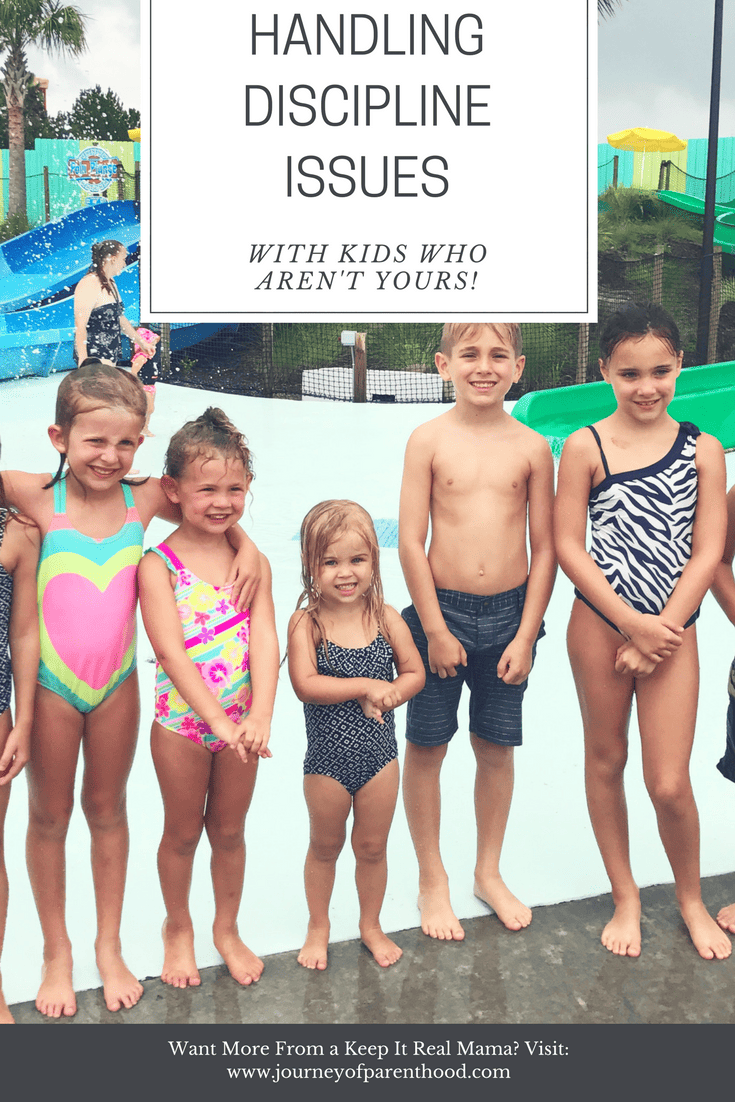Playdates are wonderful. They are an opportunity for our children to learn and practice social skills. They are a chance for them to develop friendships. An opportunity to play with children outside of their siblings. They are also a chance for us to bond with other moms!
There is, however, a downside to playdates. How do you deal with the other children? No two mamas parent exactly alike. We all have our areas that we are “hardcore about” as well as ones that we “slack” on. What about when our styles clash with fellow mothers in our same play group? What about those times where their children are behaving in a way in which you wouldn’t allow yours to behave? How do you handle this tricky situation?

Have an Upfront Conversation: Depending on the bond you share with the fellow moms at the playdate, it’s great to kick things off with a general statement. Something like “Hey guys, I trust y’all so feel free to get onto my kids if you see them doing something they shouldn’t.” This opens the door for the other moms to agree. If everyone is on the same page then the awkwardness dissipates. If your friends’ son is hitting another child and you see it first, you don’t have to worry about speaking up and getting onto him because you already have the “go ahead” from his mom to do so.
Establish Ground Rules: Some stuff is pretty much across the board with most moms. Hitting each other, cutting in line, snatching from each other, etc are all pretty basic. However there are a LOT of grey areas when it comes to things parents may or may not choose to discipline about. If you’re meeting up at a restaurant play place it may be wise to ask “Are you cool with climbing up the slide or not?” Personally I’m an “up the stairs, down the slide” type of mom but I wouldn’t want to get onto someone else’s child for doing that if it’s not a rule they have established. This is also a good rule of thumb when treats are involved. Same situation: meeting up at a restaurant. As the kids play maybe ask if everyone plans to get a dessert after lunch or not? That way one kid doesn’t end up getting an ice cream while the others may feel left out or could even cause that mom trying to save money or limit sweets to be uncomfortable.
Get Onto Your Own Children: Hearing you get onto your children is a great way for other moms to tune into your parenting style. If my kids climb up the slide then I will say “no sir, we go up the stairs then down the slide.” Other parents around me instantly know that I stick to a “slide down, don’t climb up” rule. If your child is being ugly to another one or not taking turns, speak up and say something to them about it.
Sometimes moms feel uncomfortable disciplining their own children in a group setting, I personally feel that by getting onto my kids (as needed) it allows other moms around me to feel more comfortable to get onto their own children as well as to get onto mine because they will know I’m fine with it! Obviously my intention is never to embarrass my child and if it’s a situation where something takes place that needs further discipline action than just a gentle reminder (such as if my child is ugly or rude to another child) then I will pull them aside and speak with them privately. But even taking the time away from chatting with my friends to speak to my child sets that example for others to feel comfortable doing the same with their children.
It also lets my children know that rules are rules and they are in place wherever we go and whoever we’re with. If anything my children know they are to set an example for the other kids they play with. Expectations are higher for me with my kids in playdate settings than they are at home with siblings.
Communicate With Fellow Moms: When we’re all sitting around chatting it’s easy to miss what may be happening with our kids. I want my friends to point things out to me if I need to get onto my child for something. I also feel comfortable letting fellow moms know if I notice something their child is doing. Just as I’d let them know if their child was doing something potentially unsafe, I also try to let them know if their child is doing something unkind or making a poor choice that they may want to be aware of. If possible I’ll kinda whisper to the mom or do a head nod in the direction of the child etc. Like the slide example. If their child is climbing up the slide I might just say “Hey, just fyi Little Jimmy is climbing up the slide.” This allows them to handle any discipline actions they may choose to take and it minimizes any embarrassment they may feel if I called them out in a loud way or got onto their child with them sitting right there. I know as a parent I prefer to be the one to discipline my children rather than a friend or other family member so I’d appreciate that heads up!
Get Onto The Other Child: I have found the more children I have, the more comfortable I am with getting onto other people’s kids as needed. During times when we’re out somewhere and a child is acting up and a parent is no where to be found then I have NO hesitation with getting onto a child. Just the other night we were at a restaurant with an arcade area and a child was continuing to reset the game over and over while a long line was formed waiting for a turn. I gently spoke to the child that he needed to be finished and allow someone else a chance. When he straight up ignored me I told him I’d gladly go find his mother. Luckily during all this exchange his mother did come over and she removed him from the game for someone else to have a turn. It was a tad awkward with the mom when she came up but I smiled nicely at her and hope she wasn’t embarrassed or bothered by what had happened. Most parents want their children to make good choices and most parents aren’t bothered by a kind reminder from another parent towards their child. We’re a village, remember?
When it’s a situation where I’m there with the parent and see their child doing something that I view as requiring discipline on some level I will tell the parent if possible. If it’s not possible or it just doesn’t make sense to take the time to do so I will talk as nicely as possible to their child. I typically find myself using the child’s name along with the word “sweety” or “buddy” and I tend to phrase my request to stop whatever they are doing in the form of a question. Which are all things I’d NEVER do when disciplining my own children, but I feel it softens the situation and hopefully helps my friend not to feel uncomfortable with the exchange taking place between myself and their child. Using the slide example again I may say “Hey Little Jimmy, let’s go up the stairs and then down the slide, ok buddy?”
Often when I’m disciplining someone else’s child, I get straight up ignored by that child. Usually if the parent is within ear shot they quickly step in and handle the discipline and get that obedience. But when they aren’t around? And I’m ignored? I will continue to get onto the child if it’s a situation that can affect my children in some way either by endangering their safety or causing them to hear or witness things they shouldn’t.
When Other Children Are In Your Care: Sometimes I keep other children in my home. Maybe it’s for a playdate, maybe it’s to allow a friend a break. When I have children in my care, I expect them to obey our house rules. I don’t treat them much differently than my own children and I don’t hesitate at all when it comes to disciplining them as needed.
I used to babysit in college and found that the more structured I was with the kids I babysat for, the more they respected me and the more they also felt bonded with me! Kids thrive on structure and enjoy having boundaries and set rules. I will gently, yet sternly, remind the visiting child of our rules and will implement a consequence if needed. Usually a firm, gentle reminder is all it takes though! I typically do this by stating the child’s name, reminding of the rule using the term “we” and then requesting a “yes ma’am” response so I know I’m heard and understood. For example if a child is over playing and they go up the slide I might say “Little Jimmy. We don’t go up the slide, we go up the stairs and then down the slide. Yes ma’am?”
If Little Jimmy were to continue going up the slide I would continue to remind and probably after a few times say “Little Jimmy. We don’t go up the slide. If you choose to go up the slide again you will have to sit out.” Then stick to it! Sitting out for a few minutes of playtime is a BIG DEAL to a small child but it’s also not anything that any parent would be upset over. I’ve never actually had any discipline issues happen with other children in my home that I felt were even necessary to tell their parent once the playdate ended. The last thing a mama needs after a break from her child is to hear that he required discipline!
Discussions With Your Children: Just as it’s important to communicate with your friends regarding their children, it’s important to communicate with your children too. Remind them prior to a playdate about the expectations you have for them. Encourage them and let them know you have full confidence that they will do a great job! That the playdate will be FUN but that they will also be positive role models for the other children.
When leaving a playdate, somethings may also need to be discussed. Maybe a child in your group uses language that you personally don’t use in your home. While you wouldn’t say anything in the group setting, it’s something you would want to speak to your children about after the fact. Let’s say Little Jimmy runs around saying “shut up” to the other kids. His mom may not mind that phrase, but in our home we don’t say it. I wouldn’t get onto Little Jimmy or say anything to his mom in that moment. She clearly can hear him and she’s not batting an eye about it, so it’s obviously something she’s okay with. Instead, I’d wait until we left the playdate and would then discuss it with my children. Never in a way that is talking poorly about the other child or his parents, but simply something like “I heard Little Jimmy saying an ugly word, I’m proud of you for not using that word and I want to just remind you that it’s not a word we say in our family.”
Sometimes my children will speak up and say something. They will point out a behavior of another child while in the group setting. It can be a tad embarrassing both for myself and the other parent. Usually I will try to pull my child aside and either thank them for bringing it to our attention (if it’s something we needed to know) or tell them that that child’s family may have different rules than our family and that he is allowed to climb up the slide etc.
When Your Not Allowed To Discipline The Other Child: Sometimes even when you are upfront about being cool with your friends disciplining your children, they may not agree. And that’s okay! Hopefully they let you know how they’d like issues handled. Maybe they’d rather nothing be said at all, maybe they’d rather you point something out directly to them.
I have found in those types of situations where I’m not comfortable saying anything to the child, that sometimes it’s best to let my children do the talking. If Little Jimmy hits my child and no one sees it and my child comes to me…I may have them go talk to Little Jimmy’s mom. Let her handle it the way she sees fit with Little Jimmy.
Let The Kids Work It Out: Majority of the time in playdates the issues that arise are among the kids. So and so went out of turn. So and so took the toy I was playing with. Etc etc. Usually my friends and I agree to just let them work it out or we’ll have both sets of children sit and talk through it when an issue arises. It’s important to keep playdates pretty short as that way kids leave wanting more time to play rather than playing too long to the point of misbehavior.
I try not to ever take sides when kids are disagreeing during a playdate and, if anything, I will be more likely to get onto my child during those times. Regardless of who may be at fault, there is always an appropriate way to respond. And a big benefit of playdates is to teach our children how to respond during moments of adversity.
Don’t Have Playdates: I’m blessed with an awesome group of friends who parent in similar ways that I do. We rarely have any issues at ALL when our kids play together. But in the past I have had friends whose parenting style just didn’t mesh well with mine. I found girl’s nights out better for our friendship than playdates. Not all of our kids have to play together all the time. It’s okay to have friends that are just YOUR friends and where your kids aren’t friends with their kids!
I have also had situations with other children where I’ve had to put a stop to my children associating with them. We have a neighbor who would join us on family walks sometimes. I overheard some of the language this child used and some of the things they were explaining to my child and didn’t find it appropriate. I talked to my children and explained to them that this person was not a positive influence and that they would no longer be welcomed on our family walks.
Navigating the waters of other people’s children can be tricky. It’s so important to communicate. Communicate with your friends. Communicate with fellow parents. Communicate with your children. Even when negative situations arise with other children, it can always be turned into a learning opportunity for your children! In adult life we don’t always share the same values and belief systems with each other and the beauty of getting to know a variety of people is that we can all learn from each other and become better versions of ourselves in the process.
For me, the bottom line of it all is simply: I don’t care how you parent your children. That is your business and your decision. I in no way sit at a playdate and judge other moms for their parenting choices. You let Little Jimmy climb up the slide? Cool. You don’t believe in sharing? Awesome. I only have issue with others’ parenting decisions when they directly affect my children in some way. We all have that “Mama Bear” that will come out from time to time and when those moments come up, I try to handle it as gracefully as possible and to minimize embarrassment for myself, other parents, and any of our children.
- 10th Birthday Message For My Daughter Love Mom {Tess’s 10th Birthday Letter} - June 12, 2025
- Tips to Maintain Structure While Traveling with Kids - May 22, 2025
- A Letter to my Son on His 16th Birthday From Mom (Kye’s Bday Letter) - April 30, 2025






